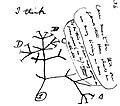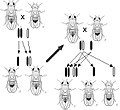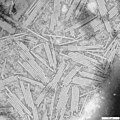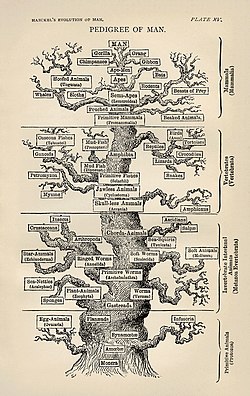Portal:Biology
Introduction


Biology is the scientific study of life and living organisms. It is a broad natural science that encompasses a wide range of fields and unifying principles that explain the structure, function, growth, origin, evolution, and distribution of life. Central to biology are five fundamental themes: the cell as the basic unit of life, genes and heredity as the basis of inheritance, evolution as the driver of biological diversity, energy transformation for sustaining life processes, and the maintenance of internal stability (homeostasis).
Biology examines life across multiple levels of organization, from molecules and cells to organisms, populations, and ecosystems. Subdisciplines include molecular biology, physiology, ecology, evolutionary biology, developmental biology, and systematics, among others. Each of these fields applies a range of methods to investigate biological phenomena, including observation, experimentation, and mathematical modeling. Modern biology is grounded in the theory of evolution by natural selection, first articulated by Charles Darwin, and in the molecular understanding of genes encoded in DNA. The discovery of the structure of DNA and advances in molecular genetics have transformed many areas of biology, leading to applications in medicine, agriculture, biotechnology, and environmental science.
Life on Earth is believed to have originated over 3.7 billion years ago. Today, it includes a vast diversity of organisms—from single-celled archaea and bacteria to complex multicellular plants, fungi, and animals. Biologists classify organisms based on shared characteristics and evolutionary relationships, using taxonomic and phylogenetic frameworks. These organisms interact with each other and with their environments in ecosystems, where they play roles in energy flow and nutrient cycling. As a constantly evolving field, biology incorporates new discoveries and technologies that enhance the understanding of life and its processes, while contributing to solutions for challenges such as disease, climate change, and biodiversity loss. (Full article...)
Selected article -

An apex predator, also known as a top predator or superpredator, is a predator at the top of a food chain, without natural predators of its own.
Apex predators are usually defined in terms of trophic dynamics, meaning that they occupy the highest trophic levels. Food chains are often far shorter on land, usually limited to being secondary consumers – for example, wolves prey mostly upon large herbivores (primary consumers), which eat plants (primary producers). The apex predator concept is applied in wildlife management, conservation, and ecotourism. (Full article...)
Selected picture -
Major topics
Selected biography -
Alice May Roberts FRSB (born 19 May 1973) is an English academic, TV presenter and author. Since 2012 she has been professor of Public Engagement in Science at the University of Birmingham. She was president of the charity Humanists UK from January 2019 to May 2022, and is now a vice-president of the organisation. (Full article...)
General images -
Did you know -
- ... that endemics along the wildlife of Morocco include more than six hundred species of vascular plants and a single species of bird?
- ... that an extract of Alchemilla diademata, a plant endemic to Lebanon, shows antimicrobial activity against Staphylococcus aureus?
- ... that more than 5,000 hen fleas were recorded from the nest of a coal tit?
Things you can do
Related portals
Biology portals
Categories

Anatomy - Anthropology - Astrobiology - Biochemistry - Bioengineering - Bioinformatics - Biotechnology - Botany - Cell biology - Conservation biology - Developmental biology - Ecology - Environmental science - Evolutionary biology - Genetics - Mathematical biology - Medicine - Microbiology - Immunology - Molecular biology - Mycology - Neuroscience - Paleontology - Palynology Parasitology - Pharmacology -
Phylogenetics - Physiology - Systems biology - Taxonomy - Toxicology - Virology - ZoologyMore topics
WikiProjects

WikiProjects connected with biology:
A complete list of scientific WikiProjects can be found here. See also Wikispecies, a Wikimedia project dedicated to classification of biological species.
Associated Wikimedia
The following Wikimedia Foundation sister projects provide more on this subject:
-
Commons
Free media repository -
Wikibooks
Free textbooks and manuals -
Wikidata
Free knowledge base -
Wikinews
Free-content news -
Wikiquote
Collection of quotations -
Wikisource
Free-content library -
Wikiversity
Free learning tools -
Wiktionary
Dictionary and thesaurus



























































